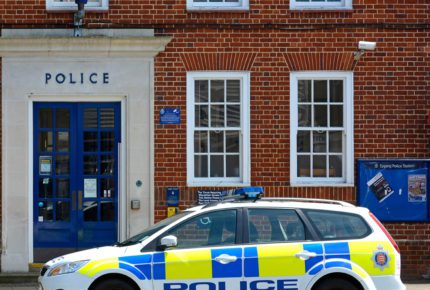

If you’ve been released on bail in the UK, it’s essential to understand what happens next. Understandably, you could be feeling confused and anxious about the bail process and what will happen when your bail expires. In short, when your bail expires, you may be required to appear in court. If you don’t attend court when required, a warrant may be issued for your arrest. There is, however, slightly more to it than that. In this article, we’ll explain what happens during the bail process and what happens when bail expires, and we’ll answer some of the more common questions we get about this – at times – bewildering topic.
What is bail?
The term ‘bail‘ refers to when you are released from police custody until your court hearing or trial. Not everyone is given bail; much is dependent on the nature of the crime you are alleged to have committed, and the perceived risk of you being a harm to the public or to yourself.
If you are charged at the police station, you might be released on bail thereafter. You might also be given bail after the first court hearing while you are awaiting your trial date.
- If you are a suspect in an investigation, you are released on police bail
- If you have been charged with a crime and are awaiting trial, you are released on court bail
If the police or the court decides that you are too high of a risk to be given bail, any time you spend in custody prior to your trial should be taken off any eventual sentence you are given if you are found guilty.
What does conditional bail mean?
When you are granted bail, you are not simply free to go on the assumption that you will turn up at the court for your hearing or trial. Instead, you are released on what is called ‘conditional bail’. Conditional bail means that you are released, but there are conditions attached to your release. If you break those conditions, you may be re-arrested and held in custody until your hearing or trial date (as well as charged with further offences, if that is the behaviour that broke your bail conditions).
Examples of the most common bail conditions are:
- being required to live at a particular address
- being prohibited from contacting certain people
- having to hand in your passport to the police so you cannot leave the UK
- having to report to a police station at agreed times (e.g., once a week)
What happens when bail expires?
If you have been released on police bail, your bail will expire when the police either:
- charge you with a crime
- release you without charge
If you have been released on court bail, your bail will end when:
- your case is dropped (e.g., if the CPS decides not to charge you)
- you are sentenced (if you are found guilty)
- you are found not guilty and told ‘you are free to go’
When bail ends, you will either have been charged or convicted, thus will be instructed by the police or the court what comes next. Or, you will be released without charge or found not guilty, and therefore will be free to go back to life as normal.
What does it mean if bail is extended?
If the police or the court want to keep you on bail but need more time to investigate what has happened, they can extend your bail. This usually happens if there is a complex investigation, or if more than one suspect is involved. You will be given a new bail date and will have to return to the police station or court on that date.
If you are arrested on suspicion of a new crime while you are on bail, your bail for the original offence will usually be cancelled. You might then be released on bail for the new offence, or you might be kept in custody until your trial or first court hearing.
Can bail conditions be changed?
The police or the court can change your bail conditions at any time. For example, they might relax the conditions if they think you are cooperating with their investigation, or they might make the conditions stricter if they think you are a risk to yourself or the public.
If you want to have your bail conditions changed, you need to talk to your solicitor. They can apply to the police or court to have the conditions changed and will represent you at any hearings that are held to decide whether to change the conditions.
Do police check bail conditions?
The police can check to see if you are complying with your bail conditions at any time. They might, for example, turn up unannounced at the address where you are supposed to be living or call you into the police station for a chat. Likewise, someone might report you for breaching bail conditions (if you talk to someone you are not supposed to, for example) and then they may investigate that, with or without your knowledge. If they think you have broken your bail conditions, they can arrest you and take you back to custody.
Can bail conditions be dropped?
The police or the court can drop bail conditions at any time. For example, if you are released on bail with a condition that you live at a particular address, but then the police realise that you no longer live there, they may remove that condition from your bail or they may add a new condition relating to the new address.
People can be on bail for weeks or even months at a time, so it makes sense that bail conditions can be charged or dropped to accommodate for any changes in your life.
What happens when you go back to the police station after bail?
If you are called back into the police station at the end of your bail, the police will either charge you with an offence or they will release you without charge.
How long can you be on bail for without being charged?
Under the Police and Criminal Evidence Act 1984, the police could hold you on bail for as long as they liked. This meant that investigations went on for weeks, months, or even years at times, and this put a huge strain on the lives of those released on bail. For many, they waited in limbo for updates from the police that often never came.
The good news is that the law has now been revised. Under the more recent Police, Crime, Sentencing and Courts Act 2022, suspects are now more often than not ‘released under investigation’, which is like being released on bail except there are no conditions attached. How long can police keep you under investigation? Interestingly, there is no time limit on being released under investigation.
If you are released on bail, however, you are likely still to get conditions attached to your release. There is, however, now a time limit for bail. The police can only keep you on bail for 3 months, and can be extended by another 3 months under an Inspector’s supervision. Senior officers (like superintendents and above) can generally extend bail for another 3 months, but anything after that has to be approved by the Magistrates’ court.
Note that cases being investigated by the Financial Conduct Authority (FCA) or the Serious Fraud Office (SFO) can result in longer bail time limits.
Can you go to jail for breaching bail conditions?
Yes, this is called being put on remand. You might get put on remand for a number of reasons, including if the police:
- want to investigate you for a new crime while you are on bail for another crime
- think you might not turn up to your next court hearing
- think you might interfere with witnesses or otherwise try to influence the outcome of your case
- think there is a risk you will hurt yourself or other people
What happens if I contact someone on bail?
In general, there is nothing prohibiting people from contacting people that are on bail. The only exceptions are if the contact would breach a bail condition that you have yourself (i.e. if you are on bail and you have been told not to contact someone else who is on bail as well) or if the contact could be classed as harassment.
How do I report breach of bail conditions?
If you think someone has breached their bail conditions, you can contact the police on 101 (or 999 if it is an emergency). You can also report this online.
The police will then investigate and, if they think there has been a breach of bail, they may take action.
Where to get more help with bail conditions and expiry
If you need more help understanding your bail conditions, or what happens when bail expires, get in touch with the criminal defence experts at Stuart Miller Solicitors. Our team has years of experience advising clients on all aspects of the criminal justice process, including bail. For a free, no-obligation consultation about your options, get in touch with us today.
(This page was last updated on November 15, 2023.)
OUR COMMITMENTS TO YOU:
-
Responsive
A legal expert will consult you within 24 hours of making an enquiry.
-
Empathetic
We will always treat you with trust, understanding and respect.
-
Specialised
Your case will be handled by an expert who specialises in your type of offence.
-
Proactive
We will take early action to end proceedings as soon as it is practically and legally possible to do so.
-
Engaged
You will be kept updated on your case at all times. We will provide a named contact available to answer your questions.
-
Caring
We understand this is a difficult and stressful time for you and your family. Our team will support you every step of the way.
-
Tenacious
We will never give up on your case. We fight tirelessly to get you the best possible outcome.
